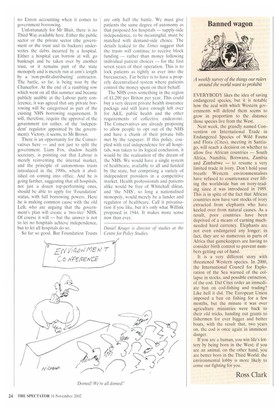Banned wagon
EVERYBODY likes the idea of saving endangered species, but it is notable how the zeal with which Western governments will defend them seems to grow in proportion to the distance those species live from the West.
Next week, the grandly named Convention on International Trade in Endangered Species of Wild Fauna and Flora (Cites), meeting in Santiago, will reach a decision on whether to allow five African countries — South Africa. Namibia, Botswana, Zambia and Zimbabwe — to resume a very limited trade in ivory. Don't hold your breath: Western environmentalists have refused to countenance ever lifting the worldwide ban on ivory-trading since it was introduced in 1989. This is in spite of the fact that African countries now have vast stocks of ivory extracted from elephants who have keeled over from natural causes. As a result, poor countries have been deprived of a means of earning muchneeded hard currency. Elephants are not even endangered any longer: in fact, they are so numerous in parts of Africa that gamekeepers are having to consider birth control to prevent numbers getting out of hand.
It is a very different story with threatened Western species. In 2000, the International Council for Exploration of the Sea warned of the collapse in stocks, and possible extinction, of the cod. Did Cites order an immediate ban on cod-fishing and trading? Like hell it did. The European Union imposed a ban on fishing for a few months, but the minute it was over agriculture ministries were back to their old tricks, handing out grants to fishermen for ever bigger and better boats, with the result that, two years on, the cod is once again in imminent danger.
If you are a human, you win life's lottery by being born in the West; if you are an animal, on the other hand, you are better born in the Third World: the environmental lobby is more likely to come out fighting for you.
Ross Clark


























































































 Previous page
Previous page